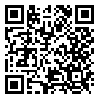Volume 8 -
MEJDS (2018) 8: 103 |
Back to browse issues page
Download citation:
BibTeX | RIS | EndNote | Medlars | ProCite | Reference Manager | RefWorks
Send citation to:



BibTeX | RIS | EndNote | Medlars | ProCite | Reference Manager | RefWorks
Send citation to:
Mostofi S, Deyreh E, Moghtader L. Prediction of Aggressive Behavior in Children with Hearing Impairment Based on Mothers' Maladaptive Emotional Schemas. MEJDS 2018; 8 :103-103
URL: http://jdisabilstud.org/article-1-952-en.html
URL: http://jdisabilstud.org/article-1-952-en.html
1- Bushehr Branch, Islamic Azad University
2- Rasht Branch, Islamic Azad University
2- Rasht Branch, Islamic Azad University
Abstract: (3085 Views)
Background and Objective: The hearing is one of the most important sensory abilities. Absence of the sense can disrupt a human reconciliation process from the environment. Children hearing loss have some consequences like aggression. On the other hand, the audiences’ aggression can also be the result of maternal schemas. Emotional schemas refer to any kind of interpretation, evaluation, action-tendency and behavior patterns that individuals take in the face of their excitement. The purpose of this study was to predict the aggression of children with hearing impairment based on maladaptive emotional schemas of mothers.
Methods: Descriptive research was correlational. The study population included 230 mothers referring to the Pajhwak deafness clinic (Rasht city, north of Iran) in 2017. Among them 144 mothers were selected that had early maladaptive schemas and an unaccented child with behavioral problems after the sampling, using the Krejcie and Morgan table With the Cochran formula. Of these, four mothers did not want to participate in the study. After ensuring confidentiality of information and results, mothers completed questionnaires. Including criteria were the participation interest to involve the research, absence of mental disorders in mothers. Exclusion criteria was presence of disorders associated with behavioral problems in an unhealthy child, such as developmental and mental disabilities. The research questionnaires included Bass and Perry aggression and Yang's maladaptive schemas. The Bass and Perry aggression questionnaire is a 29-item questionnaire that measures four aspects of aggression including physical and verbal aggression, anger and hostility. Cronbach's alpha coefficient has a total score of 0.89 in this questionnaire. The re-test correlation after a nine-week period for the total score of the questionnaire was 0.80. An incomplete yang schemas questionnaire is a questionnaire of 75 questions that measures 15 incompatible schemas in five domains. The coefficient of internal consistency of the questionnaire is 0.49 and the total Cronbach's alpha coefficient is 0.92. The data were analyzed using Pearson correlation and multiple regression and soft processing software. SPSS version 22 was used.
Results: There is a significant relationship between maladaptive schemata and aggression in deaf children (r=0.46, p<0.001). In addition, results showed that in the explanation of aggression due to incision, autonomy and impaired function, sum of predetermined variables predict and predict 0.46 of variance of criterion variables. In addition, results of multiple stepwise regression showed that the crop schema with value (p<0.001), impaired performance schema with the value (p<0.27, B=2.334) and self-regulation schema with values (p<0.034, B=234.0) could directly predict the child's aggression. Based on predicted standard values, it could be said that the crop schema over other schemes is a predictor of child aggression.
Conclusion: Maladaptive schemas in mothers predict aggressive behavior in hearing impaired children. This suggest that to reduce the aggression behavior of hearing-impaired children, it is possible to modify unsound mothers' schemas using psychological treatments.
Methods: Descriptive research was correlational. The study population included 230 mothers referring to the Pajhwak deafness clinic (Rasht city, north of Iran) in 2017. Among them 144 mothers were selected that had early maladaptive schemas and an unaccented child with behavioral problems after the sampling, using the Krejcie and Morgan table With the Cochran formula. Of these, four mothers did not want to participate in the study. After ensuring confidentiality of information and results, mothers completed questionnaires. Including criteria were the participation interest to involve the research, absence of mental disorders in mothers. Exclusion criteria was presence of disorders associated with behavioral problems in an unhealthy child, such as developmental and mental disabilities. The research questionnaires included Bass and Perry aggression and Yang's maladaptive schemas. The Bass and Perry aggression questionnaire is a 29-item questionnaire that measures four aspects of aggression including physical and verbal aggression, anger and hostility. Cronbach's alpha coefficient has a total score of 0.89 in this questionnaire. The re-test correlation after a nine-week period for the total score of the questionnaire was 0.80. An incomplete yang schemas questionnaire is a questionnaire of 75 questions that measures 15 incompatible schemas in five domains. The coefficient of internal consistency of the questionnaire is 0.49 and the total Cronbach's alpha coefficient is 0.92. The data were analyzed using Pearson correlation and multiple regression and soft processing software. SPSS version 22 was used.
Results: There is a significant relationship between maladaptive schemata and aggression in deaf children (r=0.46, p<0.001). In addition, results showed that in the explanation of aggression due to incision, autonomy and impaired function, sum of predetermined variables predict and predict 0.46 of variance of criterion variables. In addition, results of multiple stepwise regression showed that the crop schema with value (p<0.001), impaired performance schema with the value (p<0.27, B=2.334) and self-regulation schema with values (p<0.034, B=234.0) could directly predict the child's aggression. Based on predicted standard values, it could be said that the crop schema over other schemes is a predictor of child aggression.
Conclusion: Maladaptive schemas in mothers predict aggressive behavior in hearing impaired children. This suggest that to reduce the aggression behavior of hearing-impaired children, it is possible to modify unsound mothers' schemas using psychological treatments.
Type of Study: Original Research Article |
Subject:
Psychology
Send email to the article author
| Rights and permissions | |
 |
This work is licensed under a Creative Commons Attribution-NonCommercial 4.0 International License. |




